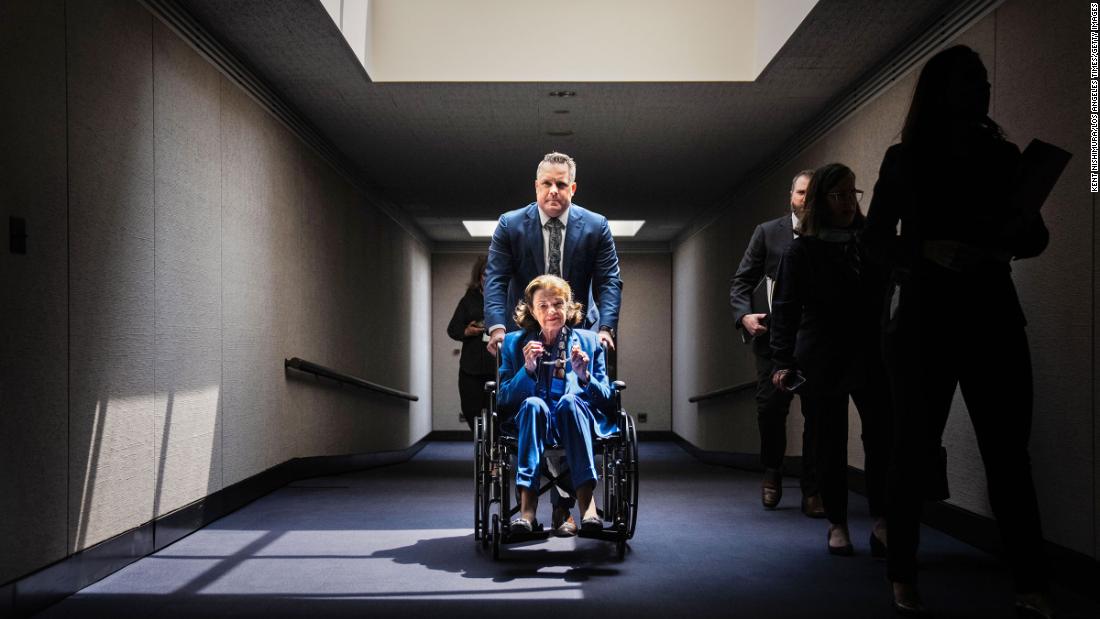- by foxnews
- 12 Mar 2025
The consequences of powerful politicians refusing to let go

A version of this story appeared in CNN's What Matters newsletter. To get it in your inbox, sign up for free here.
Most people don't want to work into their 80s and 90s, but the powerful in Washington refuse to let go.
As Americans approach the second straight presidential election in which they are on course to be offered two candidates who both would be the oldest president ever elected, everyone should take note of the as-yet unknown repercussions caused by the passing of Sen. Dianne Feinstein.
The death of the 90-year-old California Democrat - who for months ignored serious calls for her to resign - erases Democrats' one-seat Senate majority at a time when lawmakers already cannot find a way to pass a spending bill and a government shutdown looks to be days away.
California Gov. Gavin Newsom will need to quickly appoint a temporary replacement. He has said he will appoint a Black woman as a placeholder before a crowded field of potential replacements squares off in a primary in March.
Feinstein had been a shadow of her trailblazing self for years on Capitol Hill when she died this week. She had already slowed down the last time she ran for reelection in 2018. But with the power of incumbency and name recognition, voters didn't seem to mind.
The top Republican in the Senate, Minority Leader Mitch McConnell, has also showed troubling signs of age, freezing at times during press conferences. But the bouts do not seem to have jeopardized his power among Senate Republicans.
Rep. Nancy Pelosi gave up her position as the top Democrat in the House, but that may have had more to do with her party losing its majority in 2022. Pelosi, 83, is running for reelection to her San Francisco seat in 2024.
She views it as a duty.
"I think it's important for me to use my knowledge of the Congress, my knowledge of the city, my concern about the country for the benefit of my constituents. So it was really more about responsibility," Pelosi told local station KGO.
Asked separately about Biden's age, Pelosi told CNN's Anderson Cooper it's an asset.
"He has great experience and wisdom," she said. "He's been at this for a long time, as you know, as a senator, vice president, and now president."
Not all politicians share the same view. Sen. Mitt Romney, 76, the Utah Republican, said he won't be running for reelection to make room for a new crop.
"At the end of another term, I'd be in my mid-80s," Romney told reporters. "Frankly, it's time for a new generation of leaders. They're the ones that need to make the decisions that will shape the world they will be living in."
Romney wants both Biden and former President Donald Trump to step aside in the 2024 presidential race - fat chance, since they are both on course to secure their party's nominations.
Supreme Court justices, appointed in their 40s or 50s, are expected to serve for decades and then time their retirements so that their political party can appoint a successor.
But age and ailments get in the way.
George H.W. Bush, a Republican, got to appoint Clarence Thomas - who has become among the most conservative justices in history - to succeed Thurgood Marshall, appointed by a Democrat and among the most liberal justices at the time. Marshall retired in 1991, citing his failing health.
"The strenuous demands of court work and its related duties required or expected of a justice appear at this time to be incompatible with my advancing age and medical condition," Marshall, who was approaching 83 at the time, wrote in a 1991 letter of resignation. Two years later, Marshall was dead. He died four days after Bill Clinton took the oath of office.
Justice Ruth Bader Ginsburg was a hero to many liberals for her steadfast work into her 80s despite surviving cancer. She resisted public calls for her to step down during the Obama administration, arguing that sticking with her was the better option for progressives.
"Anybody who thinks that if I step down, Obama could appoint someone like me, they're misguided," she told Elle in 2014.
That is, in hindsight, a seriously flawed opinion.
Barack Obama might not have been able to appoint another Ginsburg. But he would certainly have appointed someone who would have voted with other Democrat-appointed justices to protect the nationwide abortion rights American women had until Ginsburg's replacement, Justice Amy Coney Barrett, was the deciding vote to take them away.
Democrats who actually thought for a brief moment during the Obama years after the Republican-appointed Justice Antonin Scalia died unexpectedly at 79 that they could have a long-term liberal majority on the court are now going to be grappling with a long-term conservative majority.
That is a consequential turn of events that has more to do with when two older people died than the direction of the country envisioned by voters.
As I wrote in July when questions about McConnell's age were percolating, there's an awkward gray area between legitimate questions about a person's health and ageism.
Former South Carolina Gov. Nikki Haley got some early attention for her presidential campaign when she suggested a mental competency test for politicians over 75.
It was ageist, constitutionally dubious and savvy politics all at the same time.
Haley's proposal highlighted that attacks on Biden's age (he is 80) occur without a whiff of irony that Trump is 77.
That neither Haley nor any of the other much younger Republicans challenging Trump in the 2024 primary field have so far caught fire is an indication that voters, who often skew older than the general population, don't seem to care. They like a young and exciting candidate like, say, Barack Obama. They also like an older candidate, like, say, Ronald Reagan or Biden.
The most powerful force in American politics isn't age or ideas, but rather incumbency.
As CNN's Harry Enten wrote, the most shocking result out of the 2022 midterms was not that Democrats held the Senate or that Republicans only narrowly captured the House. It was that every single Senate incumbent who ran won. Only one incumbent governor running for reelection lost.
I tried and failed to find a comprehensive look at whether younger or older candidates generally win congressional elections. But earlier this year, CNN published an interesting look at which generations are serving as lawmakers.
Millennials are America's largest generation by population, but they're one of the smallest groups that make up Congress. That suggests baby boomers, despite reaching retirement age, are holding onto their seats.
Feinstein wasn't the only nonagenarian senator. Sen. Charles Grassley turned 90 this month. He won an eighth term last November.
Biden had more than 36 years logged as a senator when he left to become vice president in 2009. If he had stayed in the Senate, he'd now have a full half-century tenure and be about a year away from eclipsing the late West Virginia Sen. Robert Byrd's Senate record of 51 years, five months and 26 days.
Byrd died while in office in 2010, and for the final years of his time as senator, he was frequently absent or had to use double canes or a wheelchair.
It's actually relatively rare for senators to die while in office. The most recent before Feinstein was Sen. John McCain, the Arizona Republican, who passed away in 2018.
American life expectancy, despite advances in medical care, was 77.4 in 2020. It has declined in recent years, and not just because of the Covid-19 pandemic.
Researchers point to poor average diet, lack of universal health care and access to guns as factors that keep Americans from living longer when compared with citizens of other countries.
But the dwindling financial security of retirement programs like Social Security and Medicare means that future generations will likely have to work longer. Their lawmakers will be right there with them.
- by foxnews
- descember 09, 2016
Daring airport trend has travelers arriving at gate 15 minutes before takeoff
Flight passengers are participating in the new viral trend, "airport theory," with flyers arriving at their gates 15 minutes before their flights depart. A travel expert weighs in.
read more


